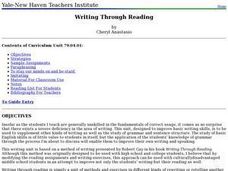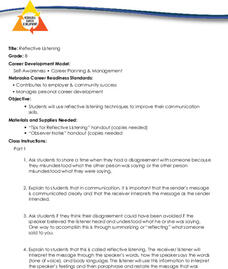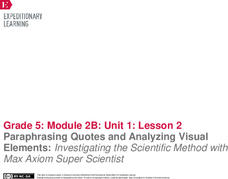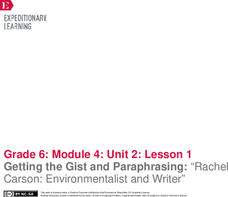Texas Education Agency (TEA)
How to Read and Analyze a Poem (English III Reading)
A poem is compressed speech, like a can of frozen juice with all the water pressed out. An interactive teaches users how to reconstitute the language, the structure, and the literary devices to appreciate all the subtleties the poet...
K20 LEARN
To Ban or Not to Ban? Intellectual Rights and Responsibilities: Banned Books, Censorship Part 2
After examining different perspectives on book banning, scholars select a book from a list of frequently banned books and research the controversies surrounding it. They then craft an argument about their chosen book, including arguments...
California Department of Education
Plagiarism is Stealing!
Stop, thief! Do your pupils understand the consequences of plagiarism? Lesson three of six in a series of college and career readiness activities demonstrates the dangers of taking credit for someone else's work. Learners engage in...
Scholastic
Comprehension During Independent Reading
Ideal for a language arts class, literary unit, or independent reading assignment, a set of reading worksheets address a wide array of skills. From poetic elements to nonfiction text features, you can surely find a valuable resource in...
Student Achievement Partners
"The Glorious Whitewasher" from The Adventures of Tom Sawyer by Mark Twain with Mini-Assessment
It's the classic scene: Tom Sawyer is whitewashing a fence. Expose your learners to Mark Twain's humor while reinforcing reading comprehension. Eighth graders are encouraged to read and reread, achieving as much exposure to the text as...
Curated OER
Language Arts: Writing Through Reading
Improve writing skills using methods from Robert Gay's Writing Through Reading; Gay espouses reproducing the work of successful writers to build the ability to convey original ideas effectively. Young writers transcribe, paraphrase, and...
Curated OER
Non-Verbal Communication
Many developmentally disabled students struggle with accurately conveying messages and interpreting those of others around them, especially when they are non-verbal. This lesson contains fun activities and exercises, such as talking with...
Curated OER
Dragonwings: Evaluate Chapters 10-12
As your class finishes the novel Dragonwings, use these culminating projects. A vocabulary list is given for chapters eleven and twelve and either an epitaph or letter activity concludes the book. The final project consists of creating a...
Curated OER
Juan Verdades
Cement comprehension skills using the strategies in this activity. After reading the story, Juan Verdades by Joe Hays, learners use context clues to answer questions, identify main ideas and details, and sequence events.
K20 LEARN
Unlocking Answers: Keys to Great Research
Successful searches for information require more than just a device with Google access. Young researchers learn how to use keywords and hashtags, as well as how to evaluate sources and how to paraphrase without plagiarizing in a fun...
Overcoming Obstacles
Writing Reports
Following a review of how to research and take notes, scholars define the term paraphrase and identify ways to organize information and finish reports. To put their newfound knowledge to the test, learners interview a peer, take notes,...
Nebraska Department of Education
Reflective Listening
Reflective listening is not casual! After learning about the practice of reflective listening, middle schoolers practice reflective listening skills in a role play activity that has them take turns being a speaker, listener, and observer.
EngageNY
Mid-Unit Assessment: On-Demand Note-Taking, Analysis, and Reflection: “Should We Drill?”
Pupils take a mid-unit assessment, completing a point of view graphic organizer based on an informational article about offshore drilling. Next, learners answer text-dependent and short-answer questions about the text.
EngageNY
Research Skills, Part 1: Natural Resource Development and How it Modifies the Physical Environment
Put it in your own words. Scholars complete a mini instructional activity about paraphrasing then complete a note catcher using the text A Limited Supply. They continue studying Canada's natural resources by analyzing the graph...
EngageNY
Explaining the Relationships between Events in a Historical Text: Contextualizing the History of Baseball (pages 8–9, 25)
In other words ... it's time to give a summary. Scholars work with a partner to paraphrase a timeline card referring to Promises to Keep. They then work to merge the two timelines to create one timeline. Pupils finish by writing a...
EngageNY
Organizing Evidence and Writing an Opinion Paragraph: The Importance of Sports in American Society, Part II
Batter up! Using the resource, pupils continue reading an informational article about sports in America and identify evidence that supports the author's opinion. Scholars then write an opinion paragraph about sports.
EngageNY
Paraphrasing Quotes and Analyzing Visual Elements, Part 2: Investigating the Scientific Method with Max Axiom Super Scientist
Solve the world's problems. Class members move on to section two of Investigating the Scientific Methods with Max Axiom Super Scientist and complete a similar activity as in the previous lesson plan. Next, they carry out a first read to...
EngageNY
Using Quotes to Explain Relationships: How the Invention of Television Changed People’s Lives
Television changes the world. Scholars determine the gist of the video clip Television Takes the World by Storm and article How Do
Inventions Affect the Way We Live? They then do a second view and read to complete an Explanation Task...
EngageNY
Paraphrasing Quotes and Analyzing Visual Elements, Part 3: Investigating the Scientific Method with Max Axiom Super Scientist
Come again? Scholars repeat actions taken in the last two lessons using section 3 of Investigating the Scientific Method with Max Axiom Super Scientist. They first read the section to determine the gist and then carry out a second read...
EngageNY
Paraphrasing Quotes and Analyzing Visual Elements: Investigating the Scientific Method with Max Axiom Super Scientist
Pay close attention. Learners discuss the things close readers do and record them in a chart. They then silently reading section 1 of Investigating the Scientific Method wit Max Axiom Super Scientist and write the gist of the text in...
EngageNY
Paraphrasing Quotes and Analyzing Visual Elements, Part 4: Investigating the Scientific Method with Max Axiom Super Scientist
Problem solved! Readers continue their work on determining gist and paraphrasing problem-solving steps by reading section four of Investigating the Scientific Method with Max Axiom Super Scientist. Learners complete a graphic organizer...
EngageNY
Conducting Research: Asking and Answering our Questions about Rainforest Arthropods
Let's ask an expert. Scholars divide into groups to research and become experts on either ants or butterflies. Learners use task cards and text on their topic to complete a note catcher. At the end, they share their information with a...
EngageNY
Taking Notes and Citing Quotes from Text: Gathering Information on our Rainforest Insects
In other words. Scholars practice using paraphrasing and quotes. They partner in pairs to write a paraphrase for an information text strip. Individuals then use their skills to paraphrase information from the text Fire Ants.
EngageNY
Getting the Gist and Paraphrasing: “Rachel Carson: Environmentalist and Writer”
Don't copy me. Scholars prepare to dig in with an introduction to their research folder and a discussion about plagiarism. They then review the meanings of harmful and beneficial and how the words apply to the use of DDT. They finish the...

























